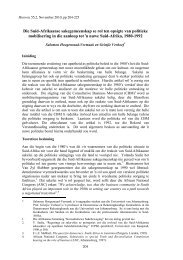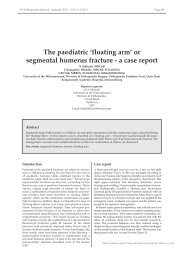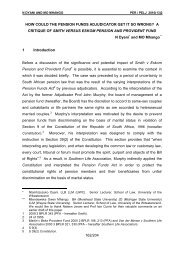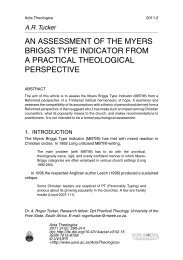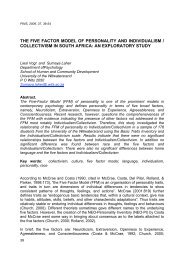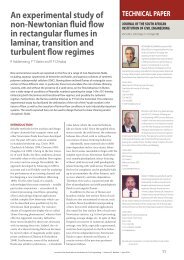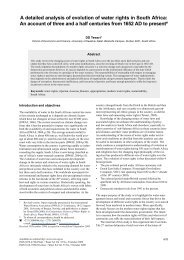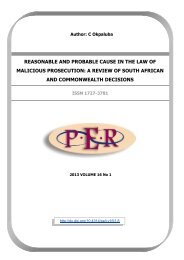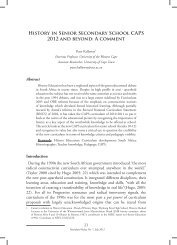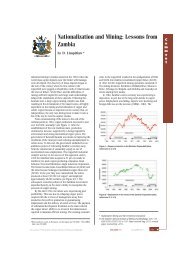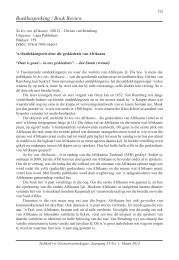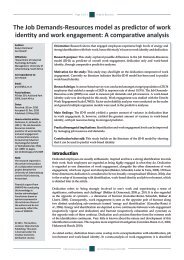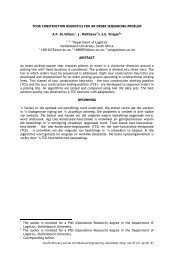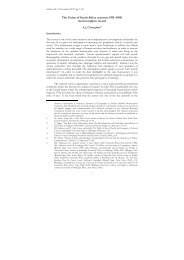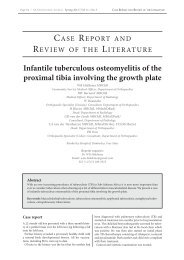Frances Baard's and Helen Joseph's struggle against apartheid ...
Frances Baard's and Helen Joseph's struggle against apartheid ...
Frances Baard's and Helen Joseph's struggle against apartheid ...
You also want an ePaper? Increase the reach of your titles
YUMPU automatically turns print PDFs into web optimized ePapers that Google loves.
Musiiwa - <strong>Frances</strong> Baard’s <strong>and</strong> <strong>Helen</strong> Joseph’s <strong>struggle</strong><br />
Yet it was one, an important one for me, <strong>and</strong> in the 1950s my feet were firmly on the road<br />
of political <strong>struggle</strong>, never to leave it again. 51<br />
Later she says: “Yet, since I had chosen the road of public political action, I could not<br />
hope to escape … police attention.” 52 In this regard Baard’s <strong>and</strong> Joseph’s autonomous<br />
choices illustrate the ways in which the individual’s unique life-plan revolves around the<br />
conditions that made the individual’s choice possible. For both women, existentialism<br />
becomes a relevant commentary on the nature of the individual autonomy, an issue that<br />
calls for an interrogation of the whole notion of “choice” <strong>and</strong>, ultimately that of human<br />
freedom to choose. In this respect, the subjective autonomy postulated in Baard’s life<br />
history <strong>and</strong> Joseph’s autobiography, facilitates a comparative appreciation of women’s<br />
experiences at the level of their interpretation of “choice”.<br />
Phenomenology<br />
Phenomenology provides a viable entry into Baard’s <strong>and</strong> Joseph’s experiences of their<br />
<strong>struggle</strong> <strong>against</strong> <strong>apartheid</strong>. Phenomenology, that is, an interpretive-descriptive analysis of<br />
experience which focuses on the link between experience <strong>and</strong> consciousness, focuses on<br />
people’s perceptions of their experiences. It is their subjective interpretation of events or<br />
phenomena, rather than a mere narration of those events. People who were struggling<br />
<strong>against</strong> <strong>apartheid</strong> presented their own perception of hegemony. According to Bozzoli:<br />
“Hegemony is, after all, a process, a ‘moving equilibrium’, in which spaces are created,<br />
fought for, <strong>and</strong> won by those at the bottom from those at the top”. 53 Baard <strong>and</strong> Joseph<br />
interpret hegemony at two levels. First, they challenge <strong>apartheid</strong> as a hegemonic political<br />
system. Baard says: I “still want this country to be like the Freedom Charter says. South<br />
Africa belongs to the people who are staying here. It belongs to them, <strong>and</strong> there is<br />
nobody who can claim it as his own.” 54 Baard seems to be preoccupied not so much with<br />
skin colour as with the system in operation. Joseph, although she is a privileged white<br />
middle-class enfranchised woman, presents her own perception of hegemony. She is<br />
explicit:<br />
I accepted that the Medical Aid Society work was to some extent constructive <strong>and</strong> not<br />
merely palliative, but it still did not help my growing feeling that it was the system itself,<br />
the colour bar, that had to be attacked. 55<br />
She perceives the suffering of the Africans <strong>and</strong> other races as having been couched in<br />
terms of skin colour; race.<br />
Second, both Baard <strong>and</strong> Joseph challenge the traditional patriarchal forms of<br />
hegemony by participating in women’s movements such as the Federation of South<br />
African Women <strong>and</strong> the ANC Women’s League. As Baard explains:<br />
But some of the women couldn’t come to the meetings. Sometimes you would be talking<br />
to a woman, telling her about the organization, <strong>and</strong> then she would say, “My husb<strong>and</strong><br />
doesn’t want me to go to the meetings …” You know what men are – some of them<br />
didn’t underst<strong>and</strong> what was happening <strong>and</strong> they would refuse for their wives to go. They<br />
51. Joseph, Side by Side, Part 1, Chapter 15, “House Arrest” (emphasis added).<br />
52. Joseph, Side by Side, Part 1, Chapter 6, “Hear us!”<br />
53. Joseph, Side by Side, Part 1, Chapter 6, “Hear us!”<br />
54. Baard <strong>and</strong> Schreiner, My Spirit is Not Banned, Part 4.<br />
55. Joseph, Side by Side, Part 1, Chapter 4, “Becoming an Activist”.<br />
75



